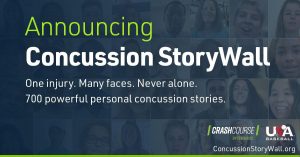Parents, you know your children better than anyone. You know what is baseline (or normal) for your children and you know and recognize any subtle differences in their behavior or personalities.
As a parent, you already play an active role in your children’s development, both in the classroom and on the athletic field. From tackling homework questions, to volunteering as a coach, to providing nutritious meals to fuel your children’s activity-filled days, you are a key member of your child’s development team. This includes your role in getting educated and recognizing concussions.
What should I do if I suspect my child has sustained a concussion?
Remove your child from play. Do not let your child return if he / she is showing any signs or symptoms of concussion. A good guideline to go by is “when in doubt, sit them out.” Have your child evaluated by a healthcare professional. Research has shown that by removing an athlete immediately following injury or as soon as concussion is suspected could cut down on recovery time. In a study of 69 high school athletes, the group that continued to play following injury took an average of 22 days longer to recovery and were 80 times more likely to take more than three weeks to achieve full recovery (Elbin et al, 2016).
Should I take my child to the Emergency Room?
The vast majority of concussions do NOT need to be evaluated in the emergency. This can lead to unnecessary costs and testing. At the time of evaluation in the ER, an ER physician cannot tell you when your child will be able to return to play safely. If your child is seen in the ER, an additional evaluation by a medical provider with training in concussion management will help better determine when it is safe for your child to return to sports.
However, an emergency referral is indicated in the following cases if your child:
- has sustained a high risk mechanism fall, such as falling from a height directly on to the head or neck
- has sustained a suspected cervical spine injury
- experiences loss of consciousness, or level of consciousness deteriorates over time (can’t walk, can’t speak)
- vomits repeatedly
- is unable to recognize people or places
- is profoundly confused
- complains of any numbness or tingling in the arms / legs
- complains of symptoms that worsen dramatically in a short period of time (typically in a matter of minutes)
These are all signs of traumatic brain injury that is likely worse than a concussion, and should be addressed in an emergent manner.
It didn’t appear that my child got hit that hard. Can he still have a concussion?
Yes. While research is still being performed on the amount of force needed to sustain a concussion, many other factors apply: whether or not the athlete was braced / prepared for the hit, the presence of rotation, momentum, etc. A fairly benign looking hit may result in a concussion, while a hit that that appears very forceful or even violent may not result in symptoms at all. Each hit and mechanism of injury is different and each injury is different.
My child was diagnosed with a concussion. Should I wake him up every hour to make sure he is okay?
Once a more serious injury is ruled out, or if your child is NOT exhibiting the red flags outline above, it is fine to let your child sleep through the night. It fact, this is a good opportunity for the brain to truly “rest.”
Check on your child by feeling for a pulse and listening / feeling for breathing.
Can I give my child any medication to help with the discomfort of a headache?
After assessment for a more serious head injury has been performed and a concussion is diagnosed or suspected, it is safe to treat a headache with ibuprofen (Motrin or Advil), acetominophen (Tylenol), or naproxen (Aleve). Any narcotics or other drugs which impact cognition and mentation should not be used.
The doctor has cleared my child to return to sports, but he doesn’t seem to be acting like himself yet. Should I go ahead and let him play?
If you suspect that your child’s injury has not fully resolved, do not hesitate to keep him out of play! Communicate your concerns with your child’s coach, athletic trainer and / or physician.
A phrase to remember is “when in doubt, sit them out.” This can apply immediately after witnessing a suspicious mechanism of injury that may lead to concussion, or when instinct tells you that your child is not ready to return to play.
I know my child needs rest to get better, but is there anything else that can be done to help him recover faster?
Much research needs to be done to show whether or not some novel interventions such as DHA supplementation, hyperbaric oxygen treatment therapy, or other unique modalities can help these injuries recover sooner.
However, concussion is treatable. At the Carolina Sports Concussion Clinic, we have seen concussion resolve with the use of sleep hygiene, excellent nutrition and hydration, compliance with low cognitive activities, cardiovascular exercise below the threshold of symptoms, as well as vestibulo-ocular exercise programs.
Contact your healthcare provider or the Carolina Sports Concussion Clinic for further information.
For more information, visit the CDC’s website for Youth Concussions: HEADS UP to Youth Sports | CDC Injury Center
To schedule an appointment or speak with a certified athletic trainer about concussions, please call the Carolina Sports Concussion Clinic Hotline at 919-238-2017.



